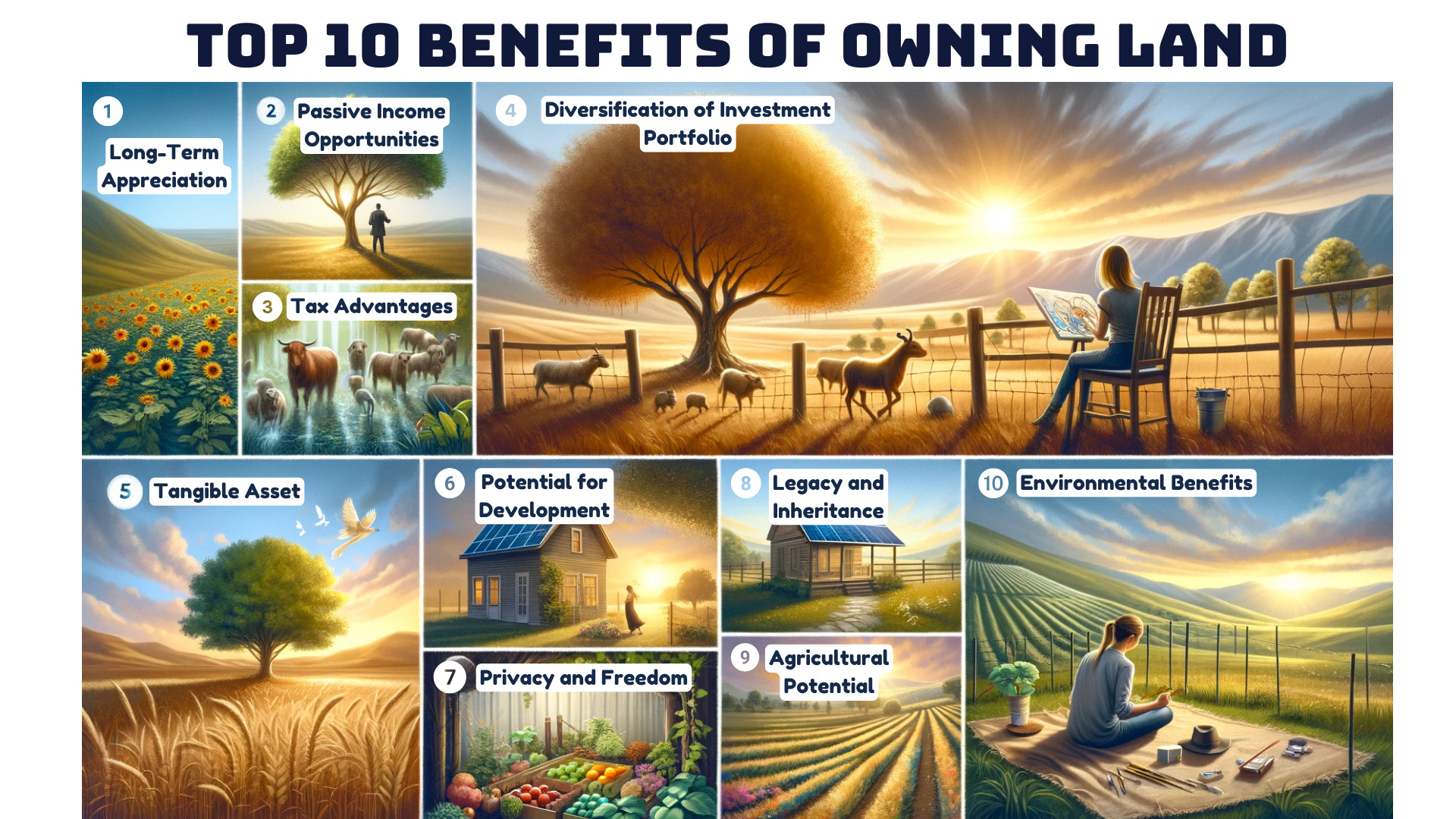Owning land has been a symbol of wealth and security for centuries. In today’s fast-paced world, the value of land goes beyond just financial gain. It represents a multitude of benefits that can enhance your lifestyle, contribute to your financial stability, and offer a legacy to future generations. In this comprehensive guide, we explore the top 10 benefits of owning land, shedding light on why it remains one of the most sought-after investments in the modern era.
Top 10 Benefits of Owning Land
1) Long-Term Appreciation:
Inherent Value: Land is a limited resource, and its inherent value tends to increase over time, particularly in areas experiencing population growth or development.
Inflation Hedge: Real estate, including land, often serves as a hedge against inflation. As living costs rise, so does the value of land.
Development Potential: Undeveloped land can significantly appreciate if it becomes a target for future development, whether for residential, commercial, or industrial use.
2) Passive Income Opportunities:
Leasing Options: Land can be leased for various purposes, such as farming, grazing, commercial developments, or renewable energy projects like wind farms or solar panels.
Minimal Management: Unlike other types of real estate investments, land often requires less active management, reducing time and money spent on upkeep.
Flexible Use: Depending on location and zoning, land can be repurposed over time to suit different income-generating needs.
3) Tax Advantages:
Deductions and Credits: Property taxes, interest on land loans, and sometimes even improvements made to the land can be tax-deductible.
Capital Gains: Selling land held for a long period often qualifies for long-term capital gains tax rates, which are typically lower than short-term rates.
1031 Exchanges: Investors can defer capital gains taxes through a 1031 exchange by reinvesting the proceeds from land sales into other investment properties.
4) Diversification of Investment Portfolio:
Reduced Volatility: The real estate market, including land, often shows less volatility compared to the stock market, providing a stabilizing effect on an investment portfolio.
Non-Correlation with Other Assets: Land values are not directly correlated with the performance of stocks and bonds, offering a cushion during market downturns.
5) Tangible Asset:
Physical Presence: Unlike stocks or digital assets, land is a physical entity that can be utilized and developed.
Control and Security: Owning land offers a sense of control and security, as it cannot be destroyed or rendered worthless overnight by market forces or company failures.
Versatile Use: Beyond its investment value, land can be used for personal enjoyment, conservation, or other purposes aligned with the owner’s interests and values.
Click here to learn more and subscribe to the newsletter
6) Potential for Development:
Personal Development: Land offers the space to build a custom home, create a private retreat, or establish a hobby farm, providing a unique opportunity to realize personal aspirations.
Commercial Development: The potential to develop land into residential complexes, commercial buildings, or industrial facilities can lead to significant financial gains. This aspect is particularly appealing in areas with growing populations and increasing demand for housing and services.
Community Impact: Developing land can positively impact the local community by providing housing, creating jobs, and improving infrastructure.
7) Privacy and Freedom:
Personal Sanctuary: Land ownership can serve as a retreat from crowded urban areas, offering a peaceful and private environment.
Control Over Use: With fewer restrictions than urban properties, landowners have more freedom to use their property as they wish, be it for recreational activities, conservation, or unconventional projects.
Customization and Creativity: The spaciousness of land allows for creative uses, such as establishing gardens, building unique structures, or even setting up renewable energy sources like solar panels or wind turbines.
8) Legacy and Inheritance:
Generational Wealth: Land is a tangible asset that can be passed down through generations, offering long-term financial security and a sense of continuity for a family.
Emotional Value: Beyond its monetary worth, land can hold sentimental value, embodying family history and memories, which can be priceless to descendants.
Foundation for Future Growth: As an inheritable asset, land provides a foundation upon which future generations can build, whether they choose to develop, preserve, or utilize it in new ways.
9) Agricultural Potential:
Farming Opportunities: Fertile land can be used for various types of farming, from growing crops to raising livestock, providing a source of income or self-sustenance.
Sustainable Living: For those interested in sustainability, owning agricultural land allows for practices like organic farming, permaculture, and renewable energy projects.
Agri-business Ventures: There’s potential for more extensive agricultural operations, such as commercial farming, vineyards, or agri-tourism, which can be lucrative businesses.
10) Environmental Benefits:
Habitat Preservation: Owning land allows for the protection and maintenance of natural habitats, essential for wildlife conservation and biodiversity.
Climate Change Mitigation: Through activities like tree planting and sustainable land management, landowners can contribute to carbon sequestration and combat climate change.
Ecosystem Restoration: Establishing wildlife sanctuaries or engaging in reforestation can restore degraded areas, enhancing ecological balance and promoting biodiversity.

Community and Cultural Impact of Land Ownership
Land ownership has far-reaching impacts on communities and culture that go beyond the personal benefits to the landowner. At the community level, landowners shape the physical landscape and character of neighborhoods by deciding what to do with their property. Tracts of privately owned land can be developed into parks, nature preserves, community gardens, or other spaces that provide recreational and social benefits to residents. In communities with significant amounts of undeveloped land, owners play an important role in conservation and environmental sustainability efforts.
On a cultural level, land ownership preserves tradition and heritage. Groups that own tracts of land can use it to pass down traditional knowledge, host cultural events and ceremonies, grow traditional crops, and generally maintain cultural practices. For indigenous communities in particular, land ownership has been crucial for cultural survival and self-determination in the face of colonialism. More broadly, privately owned historic sites and land holdings with significance to a certain cultural or ethnic group help sustain community identity and coherence.
Unequal distribution of land ownership can also perpetuate racial/ethnic and socioeconomic disparities within a community. Histories of racist land expropriation still reverberate, robbing marginalized groups of cultural anchors and resources. Integrating more equitable land distribution and ownership practices can thus be consequential for rebuilding social cohesion and harmony in divided societies.
In essence, land as a fundamental social good has the power to shape communities by determining who can access and control space. Its distribution and use are tied to preserving heritage, promoting cooperation, and either mitigating or reinforcing cultural divisions. Responsible land ownership and policy can nurture inclusive, vibrant communities.
Get your free “2024 Real Estate Market Outlook” now!
Conclusion
In conclusion, land ownership confers a diverse range of benefits that make it an extremely valuable asset on multiple fronts. Financially, land acts as a stable, appreciation-gaining investment that diversifies one’s holdings and generates income through everything from rent to agriculture.
Additionally, land ownership fulfills several profound personal needs and desires. Having a piece of land to call one’s own and shape as desired provides a great sense of satisfaction, individuality, and empowerment. For many, owning land represents the attainment of a lifelong dream and bolsters their self-confidence and identity.
Owning undeveloped plots of land also enables broader social and environmental contributions. Landowners become stewards of local ecosystems and wildlife, while having the opportunity to add public-serving amenities that bring communities together. On a cultural level, land preservation aids heritage conservation and community cohesion.
While the responsibilities and expenses of ownership pose some challenges, they encourage proactive engagement. Overall, land’s financial value, personal meaning, and community impact make it a uniquely versatile asset. Whether seeking stable returns, creative fulfilment, or cultural influence, land ownership delivers on multiple fronts. Its diverse virtues will continue making it an aspiration and wise investment choice for generations to come.
Interested in multifamily real estate investing? Our experienced team is here to help. From market research to identifying the best opportunities, we guide you through the process. Subscribe to our YouTube channel for informative videos and expert discussions, and follow us on Instagram for exclusive content. Explore our comprehensive Udemy course for detailed insights and strategies. Ready to elevate your investment journey? Contact us now to schedule a consultation and achieve your financial goals in real estate.
*This content is for informational purposes only and is not intended as financial or legal advice. Please consult with a professional advisor before making any investment decisions.




























